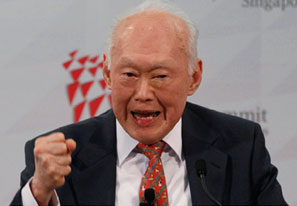
The founder of the independent city-state of Singapore, Lee Kwan Yew, who has just died at 91, was undoubtedly the most intelligent and capable world leader of the past half-century. This is not the same, of course, as having been universally loved: but he was intelligent enough to know that universal approbation is not an appropriate goal for a politician. Many detested him for his authoritarianism which, however, fell far short of despotism; no one could deny his achievement in turning an unpromising colonial entrepôt into one of the most prosperous and efficient small states in the world. Indeed, the very efficiency with which it is now administered is one of the reproaches against him; it now seems almost intimidatingly tidy and well-organized, with little scope for the free expression of the crookedness of the timber from which Kant thought that mankind is made, and in which he delighted.
Like many politicians brought up in the twilight of empire, he both admired and disliked the colonial power. He spoke the most perfect English (educated Singaporeans now speak better English than the English, even the educated English, and, of course, Chinese into the bargain). He was educated in London and Cambridge, and he recalled admiringly the way evening newspapers were piled in the street in London and people paid for them by leaving their money without any compulsion to do so and without ever stealing what others had left. This, he thought, was a well-ordered and disciplined society, and he resolved to bring such good order and discipline to his own society. Long before his demise, he had the pleasure of being able to reverse the flow of moral example, and of seeing the former colonial power, which had always prided itself on its moral, intellectual and political superiority, sunk in what he thought was terminal decline and decadence.
Finally, a reason to check your email.
Sign up for our free newsletter today.
Unlike the good order and discipline that he thought he saw in England, which had grown more or less organically from the country’s history, Singapore’s had to be brought about by stern and some would say oppressive legislation. Lee Kwan Yew had no problems with elitism, provided it brought about an elite of intelligence and ability (not always quite the same thing); the fashionable theories of liberal educationists had no attraction for him. No politician has ever defended more fiercely than Lee Kwan Yew the importance for a society of fostering high intelligence.
He was no moral relativist. Observing that it was difficult to look either kindly or intelligent while chewing gum, and that gum-chewers more often than not disposed of their gum on the pavement of the streets, he simply turned the chewing of gum into a crime. He gave even shorter shrift to drug-traffickers.
There is no doubt that his authoritarianism deprived Singapore of most of its former savor. Where people had once flocked to Bugis Street for its enormous, well-tolerated variety, its tropical exuberance, of sexual demeanor, Singapore now resembles an enormous, very well air-conditioned emporium, whose cavernous entrances expel freezing air into the humid natural heat. People come to shop from thousands of miles away. No doubt this satisfies far more people than Bugis Street ever did, but it is far less interesting.
The achievements of Singapore under Lee Kwan Yew are incontestable. Almost alone of all the countries in the word, it has developed a first-rate medical system that it can actually afford. The Singaporeans are among the healthiest people in the world. It has economic reserves that would be enviable for countries many times its size. All this is largely thanks to Lee Kwan Yew, who knew how to harness the energies of his people for their own good.
But, as with Lee Kwan Yew and the colonial power, I have a certain ambivalence about Singapore. I admire rather than like its discipline, even if I think on balance that its effects have been good. The new spirit of the place was illustrated for me once when I tried to take a taxi there. Taxis are allowed to pick up passengers only at designated places, at one of which I thought I was standing. But for a long time no taxi would stop for me. Finally I realized that I should have been standing about a yard to my right, and then a taxi stopped.
I asked the driver, who understood more English than he spoke, why no taxi had stopped for me. After all, it was only a matter of a yard. With that expressive eloquence and succinctness that an imperfect command of a language sometimes confers, he replied (and I have never forgotten it): “Singapore velly, velly law.”